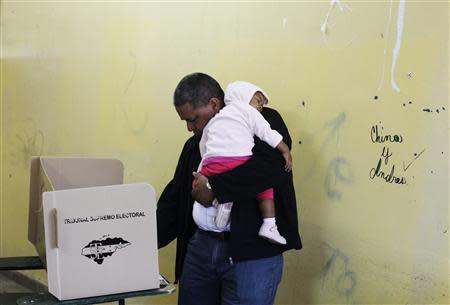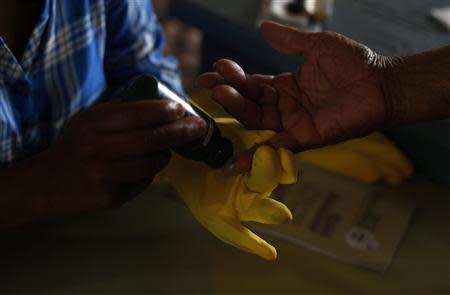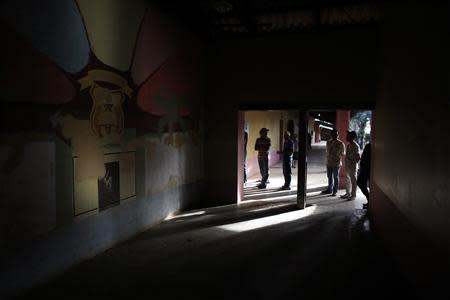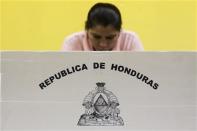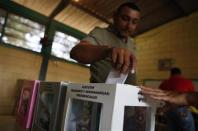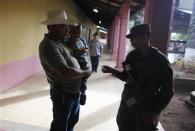Tight Honduras vote offers swing to left or militarized drug fight
By Gabriel Stargardter and Gustavo Palencia TEGUCIGALPA (Reuters) - Hondurans voted for a new president on Sunday, choosing between a tough militarized response to drug gang violence fueling the world's highest murder rate, and a shift to the left that could revive the political career of deposed leader Manuel Zelaya. A photo-finish finale is expected in a race that pits the ruling National Party's candidate, conservative Juan Hernandez, the head of Congress viewed as Honduras' most powerful politician, against Zelaya's wife, Xiomara Castro. A Castro win would put Zelaya, who was ousted in a 2009 coup that triggered a deep political and constitutional crisis, back at the heart of the presidency and decision-making. The two rivals offer distinct visions for Honduras, the biggest coffee exporter in Central America - and a nation saddled with a murder rate of 85 per 100,000, the world's worst. How to tame drug gangs is a key focus of the vote. "You can't go out onto the street," said Luis Alberto Lopez, a 54-year-old bricklayer in Tegucigalpa. "In the buses there are robbers who take what little we possess from us: vegetables, basic foods. The police don't do a thing." The atmosphere at polling stations in the capital was calm, with little visible security presence. Five people were killed near a polling station in La Mosquitia, in eastern Honduras, though police said the violence was not election-related. Castro promises to "refound" Honduras and level the playing field in a society riven by inequality. Nearly half the population earns less than a dollar a day, sparking fears among the upper classes of expropriations and land grabs by Castro. "Tomorrow a new Honduras begins," Castro said in Catacamas, a city northeast of the capital, as she waded through a crowd of supporters to cast her vote. "The people want a change." Her rival Hernandez's pledge to "do whatever it takes to bring peace and tranquility to the country," deploying the army alongside a new military police force to tame drug gangs, worries those who fear human rights abuses and corruption. "I believe whoever gets involved in crime, should be put in their place by the state," Hernandez said on Friday. "Simple." The left-leaning Castro of the Liberty and Refoundation Party, or LIBRE - a coalition of leftist politicians, unions and indigenous groups founded by Zelaya - would create a community police force and scale back the army's involvement. She also says she would rewrite the constitution, which risks antagonizing the business elite and those behind the ouster of Zelaya in 2009 after he made similar overtures. Zelaya came to power in 2006 as a conservative, but moved to the left under the influence of the late Venezuelan leader Hugo Chavez. When he explored amending the constitution, his opponents interpreted it as a bid to seek a second term. The Supreme Court ordered Zelaya's ouster and the army forced him out of the country. Honduras' Congress endorsed his removal but U.S. President Barack Obama and other foreign leaders denounced it as a coup. Also competing in the race is Liberal party candidate Mauricio Villeda. Polls have put him well behind the leading competitors and he is not expected to pose a serious challenge. LITTLE OPTIMISM Both Castro and Hernandez will struggle to put Honduras' fragile economy in order, clean up a corrupt police force and bring down the murder rate. Despite offering quite different approaches, few experts believe either will make much headway. "The problems are so profound it's hard to be terribly optimistic that no matter who wins, things will improve in the short term," said Michael Shifter, head of the Inter-American Dialogue. "They're up against tremendous odds." Many privately expect Hernandez - who appears to be everywhere, grinning from posters on sidewalks and giving handouts to the poor on television - to win. Castro has seemed strangely absent in the capital, with few campaign posters visible and little media presence. The two candidates were statistically tied in the last poll before the election, and both claimed more than 10-point leads in their own surveys, meaning that any tight result with the faintest whiff of fraud could spark violence. LIBRE has alleged a pro-Hernandez bias in the election tribunal, and it is unclear whether Castro can control her loosely-affiliated coalition if she loses. Top party officials have already hinted that protests are in the pipeline. With no clear majority expected in Congress, the eventual winner is likely have to make concessions with rival lawmakers in a move that should fend off a repeat coup. Irrespective of who wins, more than a century of two-party control has crumbled during the election, with LIBRE's emergence broadening the mainstream. A more plural Honduran political landscape will be the legacy of the vote. Many Hondurans feel little to celebrate. Waiting for his wife to finish her shift as a store assistant at a shopping center, Isaac Lopez was despondent. His paycheck meager, and with various family members targeted by the drug gangs and their "war tax," which even men selling chewing gum on the street must pay, he doubted either of the candidates could forge a fairer, less violent society. "It's a group that has always had the whole country subjugated," Lopez, 27, said of Honduras' elite. "Everything they can hold in their hands, they hoard. Whatever falls through their fingers is what's left for the poor." (Additional reporting by Miguel Gutierrez; Editing by Kieran Murray, Sandra Maler and Jackie Frank)




